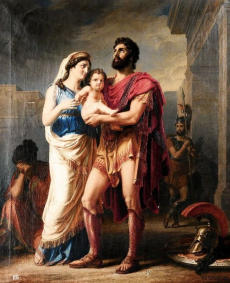
Email: EllaTournes@bexleygs.co.uk
Total Article : 45
About Me:Sixth form student currently studying English Literature, Drama and Theatre Studies, Classical Civilisation and History.

Homer creates a moving portrayal of family relationships through Hector’s desire to gain kleos for himself, to gain time for his parents. Hector talks of ‘winning great glory for (his) father and (him)self’. The phrase ‘for his father’ moves the audience, as its clear that Hector wants to share the kleos he’s gained from hard work – implied by the work ‘winning’ – with his paternal figure. The desire to make his maternal figure happy is also expressed – Hector states that he wishes to ‘bring joy to his mother’s heart’. The word ‘heart’ and ‘joy’ make the passage more richly emotive – the word ‘bring’ implies that there is not already joy in his mothers’ heart, because of the war Hector is fighting. The portrayal of Hector’s paternal figures provides an alternative portrayal of family, other than the immediate family of Hector, Andromache and their son.
Homer creates a moving portrayal of the family relationship between Hector and Andromache. Homer perpetuates Hector’s protectiveness throughout the passage. Hector states that he’d rather be ‘dead and (have) the heaped earth cover (him), before (he hears Andromache’s) scream and the sound of (her) being dragged away’. The hyperbolic nature of the phrase ‘the heaped earth cover me’ shows the length to which Hector would go to protect Andromache, and makes his love for her seem more intense. Homer also perpetuates gender roles throughout the passage to make Andromache seem sadder and more emotionally vulnerable, and to make Hector feel moved by this, and express his desire to protect her. Andromache ‘(takes her son) to her scented breast, smiling with tears in her eyes). The phrase ‘scented breast’ bears connotations of feminine softness, supported by the sibilance of the phrase. The ‘tears in her eyes’ express Andromache’s emotions, evoking sympathy from the audience. Presenting Andromache as a feminine, emotional character creates a moving portrayal of family relationships, especially when Hector says ‘please do not let your heart be too distressed’. Homer refers to both Hector’s mother and Hector’s wife’s hearts – creating a moving portrayal of family relationships by showing the emotional effect that Hector’s part in the war has had on the women of his family. The phrase ‘go back to the house, the loom and the distaff, and tell your maids to set about their tasks. War will be the men’s concern… and mine above all’ depicts Hector’s desire to protect Andromache from the harsh realities of war. Women’s work is presented as somewhat menial, domestic tasks, whereas men’s work is war. As well as showing the disparity between men and women’s roles, the phrase also creates a moving portrayal of family relationships, as Hector wants to protect Andromache.
A moving portrayal of family relationships is also created through the depiction of the relationship between Hector and his son. Homer has Hector ‘(kiss) his dear son and (dandle) him in his arms’. The verbs ‘kiss’ and ‘dandle’ bear connotations of affection and intimacy, creating a moving portrayal of their father-son relationship. Intimacy is also created through Hector and Andromache laughing over their son, giving the audience a perception of a close, intimate family unit.
Source:
https://www.google.co.uk/search?q=hector+iliad&espv=2&biw=1242&bih=557&source=lnms&tbm=isch&sa=X&ved=0ahUKEwiVsY6H7arPAhVMBsAKHY_kDv8Q_AUIBigB#imgrc=IJ1sx5QCSMaRnM%3A

0 Comment:
Be the first one to comment on this article.